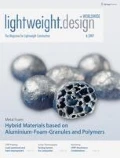Renewable raw materials underpin a sustainable bioeconomy. Bioeconomy is the knowledge-based generation and use of biological resources to provide products, processes and services in all economic sectors for a forward-looking economic system (German Bioeconomy Council, 2016). Bio-based economic management, alongside a sustainable recycling economy, targets independence from fossil resources, while a neutral carbon footprint is intended to counteract climate change. The bioeconomy is thus a key future issue for Germany, Europe and the entire world.
As renewable raw and recycling materials, natural fibres have long been used as short, long or continuous filaments in technical composite materials such as natural fibre-reinforced plastics (NFRP) and wood-polymer composites (WPC). Natural fibre composite materials, often called biocomposites, most often feature in carmaking for interior door panels and dashboards, and were even based on wood fibre from the early 1980s to the early 1990s (Fibrit). Nowadays, the focus has shifted to long vegetable fibres; processable as textiles and combined with thermoplastic or thermosetting polymers. Such fibres (phenol resin-bonded cotton) were used for Trabant car bodies in the former GDR since the 1950s. Today the field of natural fibre composites is dominated by thermoplastic polymers that allow the use of efficient plastic processing technologies (such as injection moulding and extrusion) in composite manufacture and also permit post-forming, of flat bio-organic sheets for example. The latter are prepregs in which both fibre reinforcement and polymer components are natural-based. This ensures a product fully free of all fossil raw materials and completely in line with bioeconomic principles.
New bio-based materials and efficient processing techniques suitable for series production are being developed in the MERGE EXC 1075 Federal Cluster of Excellence at the TU Chemnitz. These new, bio-based composite materials comprise natural fibre-reinforced, bio-based thermoplastics. Besides uni-directional flax rovings, the project will investigate a new bionic approach to using the intact natural fibre complex of wood in the form of thin veneers as fibre reinforcement. These research activities at the TU Dresden in the MERGE Federal Cluster of Excellence thus aim to develop sustainable products for lightweight design.
Author information
Authors and Affiliations
About this article
Cite this article
Wagenführ, A. A Lightweight Natural Fibre Composite Construction. Lightweight des worldw 10, 3 (2017). https://doi.org/10.1007/s41777-017-0017-1
Published:
Issue Date:
DOI: https://doi.org/10.1007/s41777-017-0017-1

